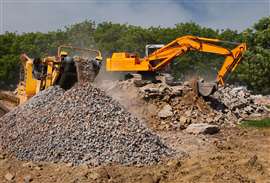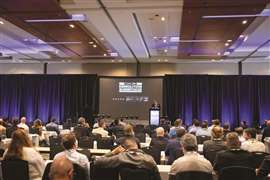Remex managing director calls for EBV revision
29 August 2023
The managing director of Remex, one of Germany’s leading recycling and waste management companies, has called on government officials to immediately revise the Substitute Building Materials Ordinance (EBV), claiming the regulations wrongly define recycled building materials as ‘waste’.
 (PHOTO: Adobe Stock)
(PHOTO: Adobe Stock)
The new EBV (Ersatzbaustoffverordnung) regulations, which came into force across the country on 1 August this year, define the legal requirements for the production and use of mineral substitute construction materials.
It has wide-reaching ramifications for products made from recycled construction and demolition waste, industrial minerals, and soils.
While it is designed to protect the country’s groundwater from pollutants and safeguard its gravel, sand and natural stone resources, Remex’s Managing Director Michael Stoll says the failure of the EBV to correctly classify recycled construction materials, means that the 200 million tonnes of recycled mineral materials produced in Germany each year cannot be marketed as high-quality products for commercial use.
In a statement published on the company’s website, Managing Director Michael Stoll said: “The sticking point is the lack of provisions on the end of waste status: recycled or substitute construction materials - until they are used - still bear the wrong label as waste.
“To make them more attractive to private and public developers, they should be they should be classified as products,”
His remarks echo that of Felix Pakleppa, General Manager of the Central Association of the German Construction Industry, who commented on the EBV in April 2023.
Felix said: “What is still missing, however, are clear and practicable end-of-waste criteria.
“To regulate nationwide that quality-assured substitute building materials are no longer waste, but high-quality building products - that would have been the decisive building block for a functioning recycling economy and the promotion of the use of recycled building materials in the construction industry.
“The attempt to make the Substitute Building Materials Ordinance more practical for users and official enforcement through clarifications has also not really succeeded.”
 Michael Stoll, Managing Director at Remex, part of the Remondis Group. (PHOTO: Remex)
Michael Stoll, Managing Director at Remex, part of the Remondis Group. (PHOTO: Remex)
In his recent statement, Michael added: “The aim should also be in Germany to bring building materials obtained from recycling more strongly onto the market.
“Here the public sector is called upon. What is currently threatening to happen as a result of the EBV is, unfortunately, exactly the opposite and is not enough to establish a circular construction industry.”
According to Michael, the use of alternative building materials needs to be further encouraged. He called on the public sector to show a greater commitment to circular economy during the procurement stages of projects.
“After all, the federal, state and local governments award construction contracts worth many billions of euros every year,” said Remex.
Remondis subsidiary Remex, which earlier this year published a 326-page practical guide on EBV for industry professionals, has suggested that the introduction of “a minimum usage rate” for the amount of recycled materials used in new construction products would noticeably strengthen the circular economy.
It said “this could be achieved through a voluntary commitment by building product manufacturers”, alongside “a halving of the VAT for building products” that contain a minimum level of recycled content.
CONNECT WITH THE TEAM










